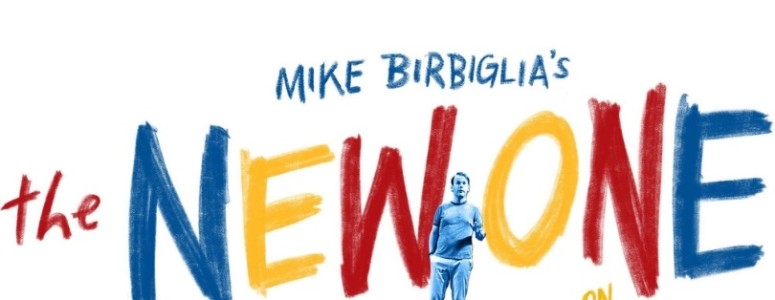A “new one” is usually considered something good, even great — and certainly better than a second-hand item.
In the case of Mike Birbiglia’s one-man oration at the Cort, THE NEW ONE may not fit that description.
Oh, not the show itself, which is witty and poignant. But then there’s “the new one” that is the baby who enters the Birbiglias’ lives.
Or should we say “a baby who invades the Birbiglias’ lives”?
Those who are considering having a child may regard this 90-minute show a cautionary tale. Those who already have one, two or more will nod their heads quite often. As Birbiglia implies, when you have a child, you suddenly have a new and unforgiving boss.
Birbiglia has a delivery as dry as the Atacama Desert. He expertly varies his delivery as if he’s his own symphony orchestra, going from strings (when he speaks in a conspiratorial whisper) to brass (when he roars in agonized pain when he recalls another unpleasant memory). Although he doesn’t laugh at his own jokes, he gives a Dustin Hoffman grin after one that gets chuckles and a broad smile for every one that gets a burst of laughter.
Birbiglia and his wife-to-be Jennifer had been together five years before they decided to officially tie the knot. Now 10 years have passed since they wed, but Birbiglia is more interested in telling us what had happened to them en route: Oona, their daughter.
Even before he married, Birbiglia had the opinion that “Children make me want to be unconscious” and noted that
“People with children are miserable.” So he and Jennifer had decided early on that they would never be parents.
Time and experience confirmed to Birbiglia that kids were a constricting pain. His nephew provided a few unpleasant experiences, which, unbeknownst to Uncle Mike, would turn out to be previews of coming attractions.
After Birbiglia makes an off-the-cuff suggestion to his brother that they take in a concert that night, the response is a roaring “I can’t go to a concert! I have kids!” It’s said with how can-you-be-so-clueless judgment.
Thus Birbiglia mourns “I’ve lost a lot of friends to kids.” A 1929 song had a lyric “Those wedding bells are breaking up that old gang of mine.” Yes – but bells on a mobile over a crib will wind up doing the same.
In the absence of statistics, Birbiglia offers anecdotal evidence that wives want children more than their husbands do. (Even one of Birbiglia’s doctors made that claim.) Certainly that was the case in the Birbiglia household after Jennifer suddenly changed her longtime view.
“A baby will not have to change the way we live,” she insisted.
(And if you believe that, I’ve got some Montana Chem I’d like to sell you.)
Birbiglia falls for the compliment that so many husbands have heard before: “You’d be a GREAT dad.”
As it turns out, simple sexual intercourse won’t do the trick. What Birbiglia details next will amuse the audience, but it was hardly fun for him.
Once the deed is done, “Jenn started eating like a college freshman.” She didn’t just have morning sickness, but morning-noon-and-night sickness. Birbiglia gets a little sick himself when he must take time-consuming trips to “holistic birthing education classes.”
All this trouble and strife pales in comparison to life after Oona is born. Birbiglia comes to feel “evicted from my own life” and likens fatherhood to the vice-presidency – which is no great honor, either.
Baby diseases are horrors for adults, too, but Birbiglia gives seven specific reasons why having a baby may be hazardous to your mental health as well. It’s all in good fun until he says “I understand why dads leave (their families).”
Theatergoers surrounding me gasped in both judgment and horror. So, just as Sondheim had to soften the message to COMPANY’s audiences – walking back that marriage was tantamount to living “happily ever after … in hell” to instead insisting that it really meant “being alive” — Birbiglia must end the show with the implication that fatherhood is ultimately well-worth it: “You can’t know what it is to have a kid until you have one.”
Or know that only 729 days after any child’s birth comes “The Terrible Twos” …




